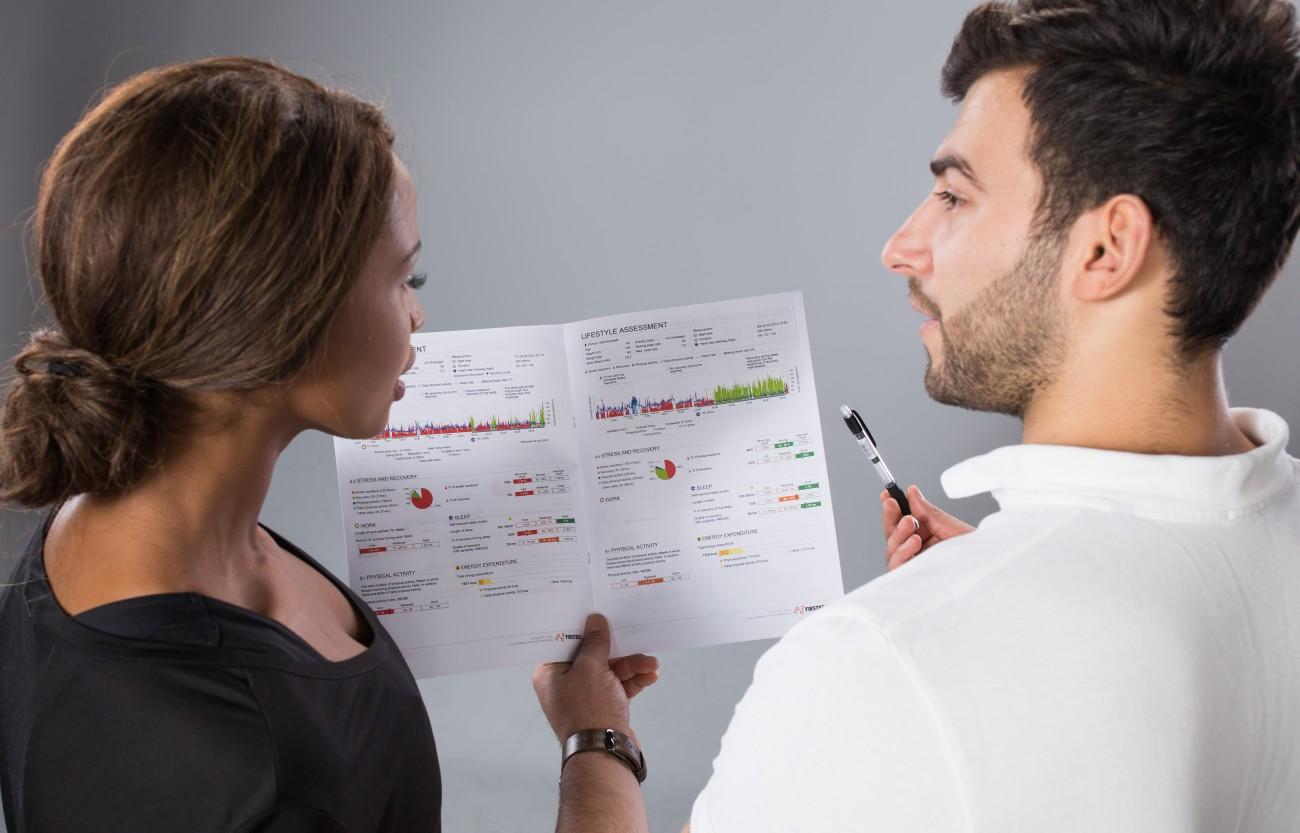
I recently spent almost 2 weeks travelling in the US, meeting Firstbeat’s partners, providing Lifestyle Assessment feedback and attending a seminar. Here are a few notes from the road:
1) Travelling across the world is tough! This is hardly news to anyone who has travelled across time zones, but still, the graph below (from my 2nd night after travel) is a stark reminder. For those familiar with Firstbeat reports, you know that the sleep period is supposed to look green (recovery), not red (stress)! I felt that I slept pretty well, but the report does not agree… my heart rate (HR) level was very high throughout the night (over 80), with the lowest HR 67 instead of the more typical 50, and heart rate variability was very low. And as if the time zone travel itself wasn’t hard enough, I added another known stressor by having a couple of glasses of wine during a social dinner.
From personal and professional experience, I know that even a small amount of alcohol can play havoc on good-quality recovery, but especially when the 2 stressors of jetlag and drinking are combined, the effect can be dramatic! Yet, this is so typical during travel – that’s when you are most likely to have the long business dinners, banquets and socializing at night, and the next day you should be playing your top game at a seminar or a business meeting. This topic has come up in hundreds of Lifestyle Assessment feedback discussions over the past few years, and has actually caused many people to make very concrete changes to their travel behaviors, to ensure top performance throughout the trip! The body can only take so many stressors without starting to show wear and tear.
A couple of bad nights here and there aren’t going to ruin an otherwise healthy person’s performance, and sometimes it can even be justified to do “field testing”, like I did here. However, I did shape up after the initial result! After several days of focusing on getting good sleep despite continued travel and time zone changes, no alcohol and an enjoyable Saturday with no work, meeting friends, being outdoors and doing some light exercise, my recovery started to look a lot better. My body was starting to recover already in the evening and the lowest sleep time HR was now 54, instead of 67. The analysis, considering the amount of recovery and quality of sleep (heart rate variability) now found my recovery to be good, instead of poor 4 nights before. I was ready for the 2nd week on the road and the seminar ahead of me!
2) I had a chance to meet the SQL Sentry group in Huntersville, NC to discuss their follow-up Lifestyle Assessment. The initial measurement was done in October 2013 and their story is written up as a Firstbeat reference case. A follow-up story will come out soon. It was great to see some enthusiasm, discuss the goals that they set last year and hear their reflections on how they had done.
People are busy, it’s not easy to make changes and sometimes things don’t go exactly as planned, but some good trends could be seen regardless! Especially the people who were physically inactive had made some positive changes and also the percent of people showing poor recovery overall had dropped. Some of the very intensive exercisers had taken note to include easier workouts in their weekly program. It’s important to be aware of the things that affect well-being and an annual reminder like this seems to serve this purpose very well. The closing remark in our meeting – “it’s what we do on most days of the week (and most weeks of the year) that counts” – is a pretty good guideline, whether thinking of exercise, eating and drinking habits or sleep.
3) The last part of my trip I attended a seminar organized by the American College of Lifestyle Medicine Treat the cause: Evidence-based practice. A very interesting event, mainly physicians with a very progressive lifestyle-centered approach. Diet (we actually ate plant-based vegan food throughout the seminar!), exercise, weight management and stress management as the cornerstones of patient interventions designed to prevent and reverse medical conditions, such as cardiovascular disease, high blood pressure, high cholesterol. Very powerful evidence and cases were presented during the lectures and we enjoyed some excellent discussions at the Firstbeat exhibition stand. Lifestyle Assessment can potentially be a very good fit for these kinds of interventions, for example as a start-up measurement.
In a nutshell, if we want to feel well and perform at a high level, good sleep, sufficient exercise, healthy food, and some enjoyable “non-stress time” daily and weekly are pretty good guidelines to follow in our normal daily life, as well as on the road!
Are you interested in supporting your well-being with accurate data about your stress and recovery levels?
You might also be interested in

Firstbeat on the Road – My Travel Blog
I wore the Firstbeat Bodyguard during a trip from Finland to the UK, including the travel day and a day on the exhibition floor at Health and Wellbeing at Work 2015 conference.

What is Presenteeism? And How Can We Fix the Multi-billion-pound Problem?
Paying proper attention to the well-being of staff will lead to a better working environment and happier, more productive employees.

The Big Picture of Wellness – Stress Management, Good Sleep and Nutrition Go Hand in Hand
Weight management and healthy eating are issues that wellness professionals face every day with their clients.


